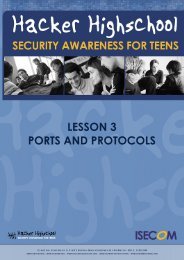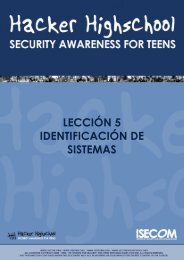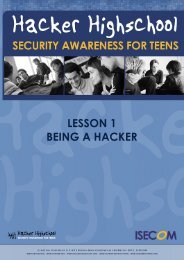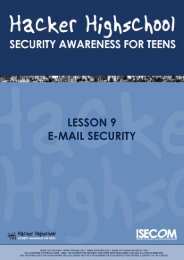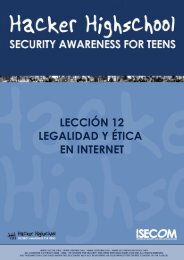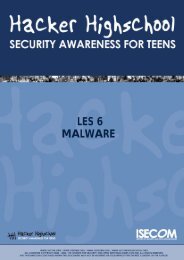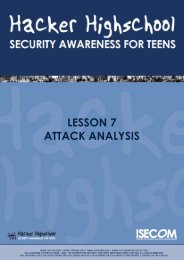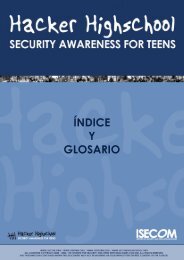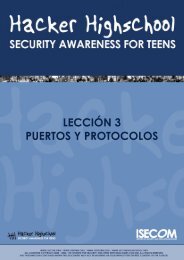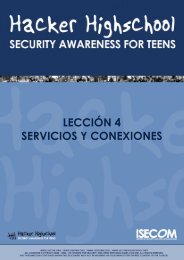Lesson 1: Being a Hacker - Hacker Highschool
Lesson 1: Being a Hacker - Hacker Highschool
Lesson 1: Being a Hacker - Hacker Highschool
You also want an ePaper? Increase the reach of your titles
YUMPU automatically turns print PDFs into web optimized ePapers that Google loves.
29<br />
<strong>Lesson</strong> 1: <strong>Being</strong> a <strong>Hacker</strong><br />
companies that created them still feel that they should not be there and are happy to<br />
demand money from the owner of any Internet gateway where it's downloaded.<br />
At the moment there is not much agreement on whether the person whose Internet<br />
access was used to download content is responsible or if the police actually have to<br />
catch the person who did it. That's like saying that if your car is used to commit a<br />
crime the owner of the car, not the driver, goes to jail. Internet laws are currently not<br />
just and not fair so be extra careful!<br />
Whether or not you are the kind of person who risks downloading intellectual property,<br />
there is no question that P2P networks can be a vital resource for finding information.<br />
Remember: there is nothing illegal about P2P networks – there are a lot of files that are<br />
available to be freely distributed under a wide variety of licenses – but there are also a lot<br />
of files on these networks that shouldn't be there. Don't be afraid to use P2P networks, but<br />
be aware of the dangers, and of what you are downloading.<br />
Exercises<br />
1.41 What are the three most popular and most used P2P networks? How does each<br />
one work? What program do you need to use it?<br />
1.42 Research the protocol of one of those P2P networks. What does it do, and how<br />
does it make downloading faster?<br />
1.43 Search for the words “download Linux.” Can you download a distribution (or<br />
distro) of Linux using P2P?<br />
Certifications<br />
There are OSSTMM Security Tester and Security Analyst certifications, various colors of<br />
“hacker” certifications, certifications based on one version of “best practices” or another<br />
and certifications with all kinds of crazy initials or pieces of punctuation.<br />
Why do you care about certifications? Because you can get some of them at any<br />
age, because you don't have to have a college degree to get them, and because<br />
they can put you in the position of the sought-after person, rather than the person<br />
asking for a gig.<br />
The problem with best-practices based certifications is that best practices change often,<br />
because best practices is just another way of saying “what everyone else is doing right<br />
now.” Often what everyone else is doing is wrong this week, and will still be wrong when<br />
they update it next week.<br />
Then there are research-based certifications, based on valid and repeatable research<br />
into human and system behavior. Needless to say our parent organization, ISECOM, falls<br />
squarely into the realm of research-based certification authorities. Whether from ISECOM<br />
or elsewhere, look for skills-based certifications and analysis-based or applied knowledge



